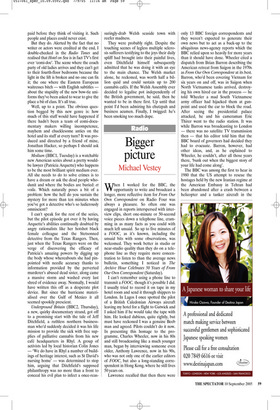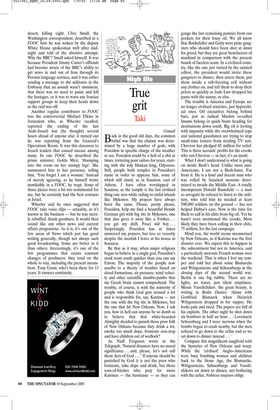Bigger picture
Michael Vestey
When I worked for the BBC, the opportunity to write and broadcast a longer, more reflective item for From Our Own Correspondent on Radio Four was always a pleasure. So often one was engaged in reports interspersed with interview clips, short one-minute or 50-second voice pieces down a telephone line, cramming in as many facts as you could with much left unsaid. So up to five minutes of a FOOC, as it’s known, including the unsaid bits with some observations, was welcomed. They work better in studio or near-studio quality than they do on a telephone line as they require more concentration to listen to than the average news bulletin, something I noticed in The Archive Hour Celebrates 50 Years of From Our Own Correspondent (Saturday).
I can’t remember using a phone line to transmit a FOOC, though it’s possible I did. I usually tried to record it on tape in my hotel room and send it through shippers to London. In Lagos I once spotted the pilot of a British Caledonian Airways aircraft leaving my hotel for a flight to Gatwick and I asked him if he would take the tape with him. He looked dubious, quite rightly, but must have reckoned I was a genuine Beeb man and agreed. Pilots couldn’t do it now. In presenting this homage to the programme, Charles Wheeler, now in his 80s and still broadcasting like a much younger man, began by interviewing someone even older, Anthony Lawrence, now in his 90s, who was not only one of the earlier editors of FOOC, but also a long-standing correspondent in Hong Kong, where he still lives 50 years on.
Lawrence recalled that then there were only 13 BBC foreign correspondents and they weren’t expected to generate their own news but to act as a back-up to the ubiquitous news-agency reports which the BBC relied upon so heavily for more years than it should have done. Wheeler cited a dispatch from Brian Barron describing the American retreat from Saigon in the 1970s as From Our Own Correspondent at its best. Barron, who’d been covering Vietnam for six years on and off, was in Saigon when North Vietnamese tanks arrived, destroying his own hired car in the process — he told Wheeler a mad South Vietnamese army officer had hijacked them at gunpoint and used the car to block the road. After seeing the presidential palace attacked, he and his cameraman Eric Thirer went to the radio station. It was while Barron was broadcasting to London — there was no satellite TV transmission then — that his editor told him that the BBC board of governors had decided they had to evacuate. Barron, however, had other ideas, and, as he explained to Wheeler, he couldn’t, after all those years there, ‘bunk out when the biggest story of your life had come along’.
The BBC was among the first to hear in 1980 that the US attempt to rescue the hostages held by the new Iranian regime at the American Embassy in Tehran had been abandoned after a crash between a helicopter and a tanker aircraft in the desert, killing eight. Clive Small, the Washington correspondent, described in a FOOC how he was woken by the deputy White House spokesman well after midnight and told of the abortive attempt. Why the BBC? Small asked himself. It was because President Jimmy Carter’s officials had become aware of the BBC’s ability to get news in and out of Iran through its Persian language services, and it was either sending a message to the militants in the Embassy that an assault wasn’t imminent, that there was no need to panic and kill the hostages, or it was to warn any Iranian support groups to keep their heads down as the raid was off.
Another regular contributor to FOOC was the controversial Michael Elkins in Jerusalem who, as Wheeler recalled, reported the ending of the last Arab–Israeli war (he thought) several hours ahead of anyone else; it turned out he was reporting from the General’s Operations Room. It was this closeness to Israeli leaders that caused unease among many. In one FOOC he described the prime minister, Golda Meir, ‘thumping into the room on her stumpy legs’. She summoned him to her presence, telling him, ‘You forget I am a woman.’ Instead of merely agreeing, as he himself wrote mawkishly in a FOOC, he wept. Some of those pieces were a bit too sentimental for me, but he certainly had the best contacts in Israel.
Wheeler said he once suggested that FOOC take voice clips — actuality, as it’s known in the business — but he was sternly rebuffed, thank goodness. It would then sound like any other news and current affairs programme. As it is, it’s one of the few areas of News which just has good writing generally, though not always such good broadcasting. Some are better at it than others. Interestingly, it’s one of the few programmes that resists constant changes of producers; they tend on the whole to stay, including the present incumbent, Tony Grant, who’s been there for 13 years. It ensures continuity.

























































 Previous page
Previous page